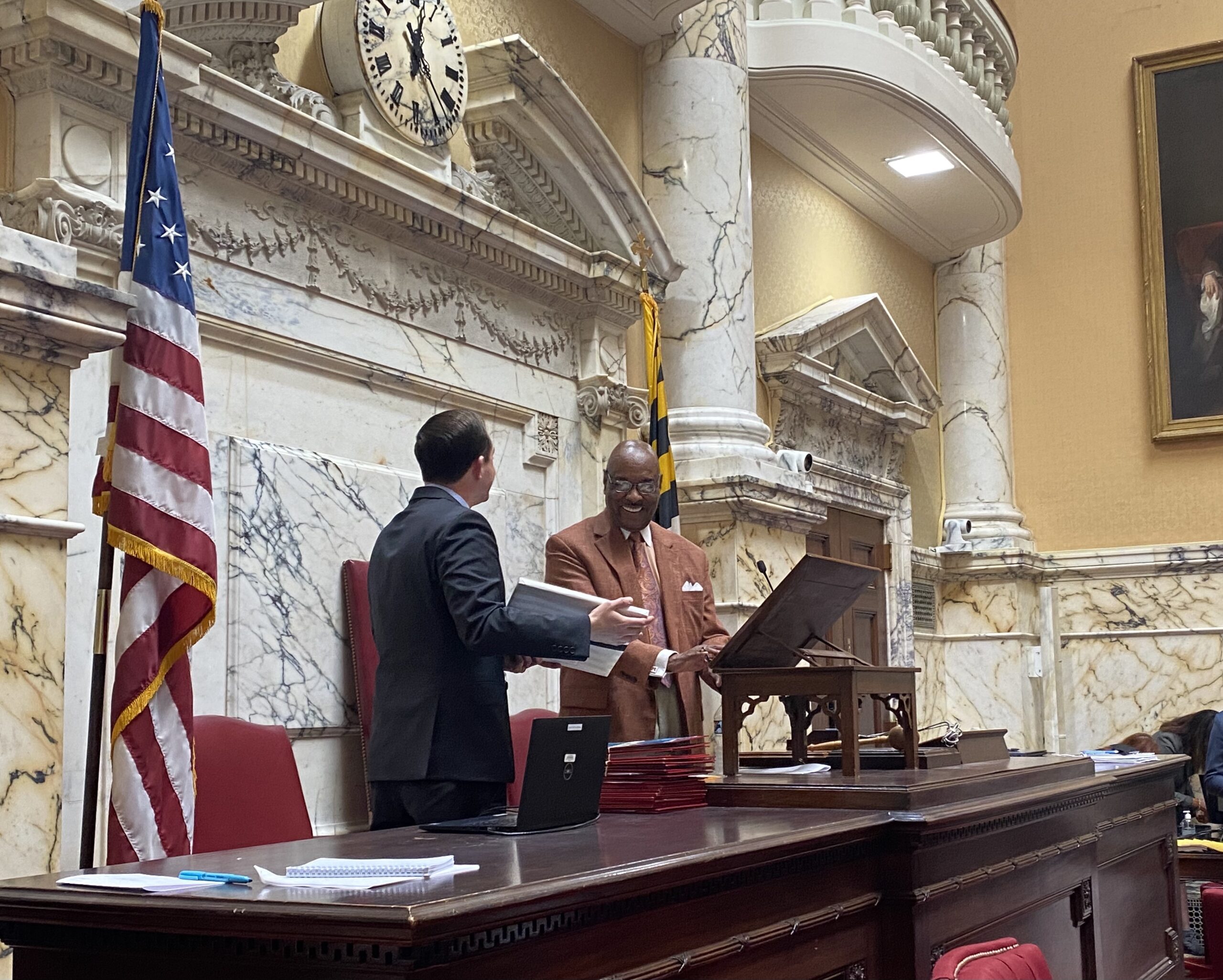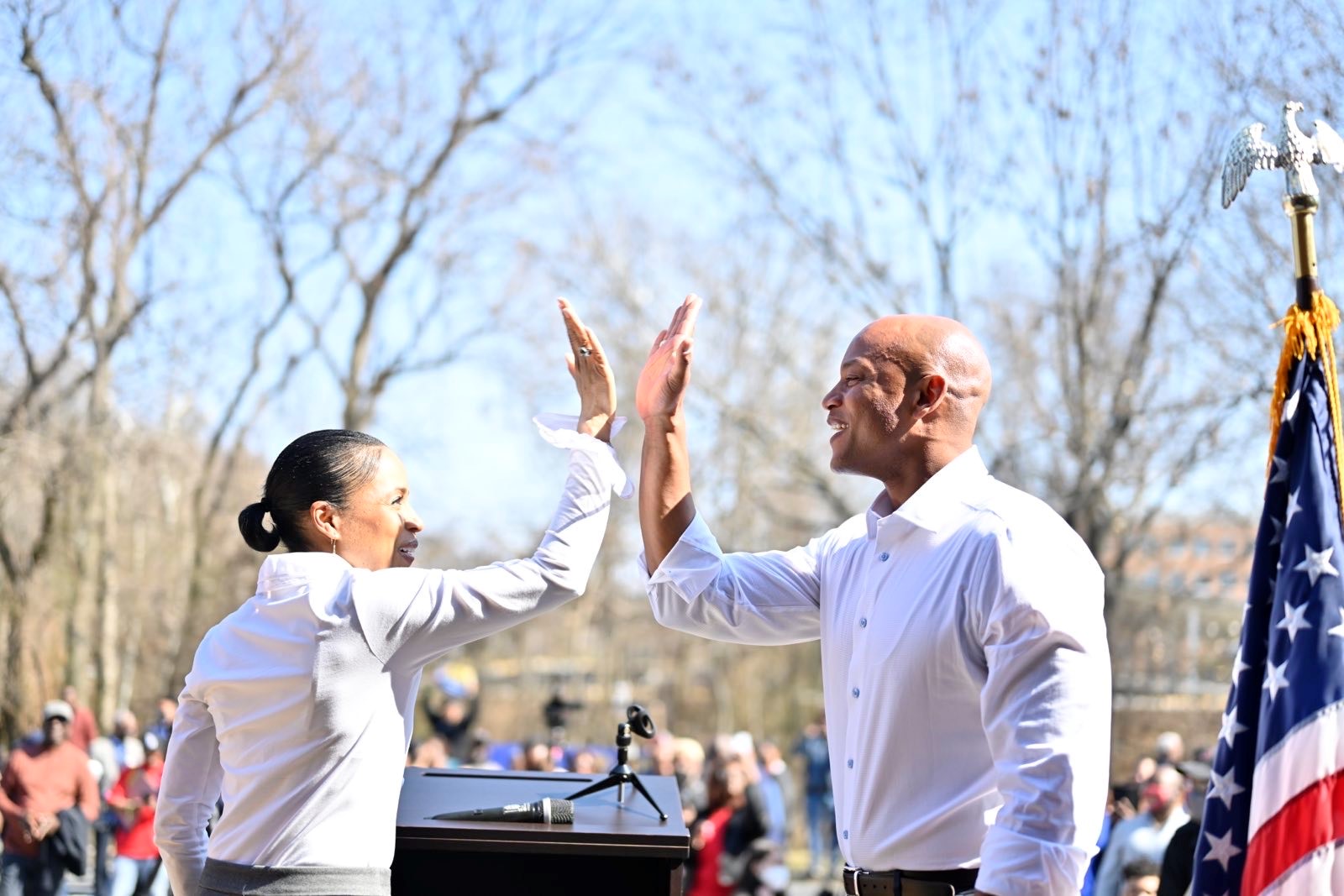Legislative Roundup: Patterson’s Decision, House Debates Hate Crime Bill, Centenarian Tax Cuts and More

One of the great mysteries of the 2022 legislative session — and the campaign season — came to an end on Wednesday, when Sen. Obie Patterson (D-Prince George’s) announced he would not be seeking reelection.
Actually, Patterson didn’t announce it — it was announced for him.
The Senate began paying tribute to retiring members this week, so Senate President Bill Ferguson (D-Baltimore City) teed up the Patterson tribute — and the news about Patterson’s imminent departure — near the end of Wednesday’s floor session.
“I had an awkward call with him,” Ferguson recounted. “I didn’t want to celebrate you if you didn’t want to be celebrated.”
But Patterson, who turned 84 last month, indicated that it was indeed time. He spent four years in the Senate, which was preceded by eight years on the Prince George’s County Council and a dozen years in the House of Delegates, a trajectory, Ferguson noted, that gave the veteran lawmaker “quite the perspective.”
“I feel extremely blessed to have worked with so many great leaders from all corners of the state,” Patterson told his colleagues. He said his one motivation for serving in office for so long has been “helping others.”
Patterson, who served in a variety of roles at the U.S. Department of Agriculture in addition to his political and civic work, said he is frequently asked what he plans to do next.
“I’ve worked for 57 years,” he said, answering the question. “I might just want to stop and rest.”
But Patterson said he intended to remain active in the community and would also work to elect people with “similar visions.”
“While I may not be a candidate in 2022, I plan to be one of the most active campaigners you will ever find out there,” he said.
With Patterson out of the 26th District race, former Sen. C. Anthony Muse (D), who held the seat before him, is now the early frontrunner to replace him. But there are at least two other Democrats running: Charles Winston McNeill Jr., senior pastor of the Unity Baptist Church in Washington, D.C., and Tamara Davis Brown, who is making her fourth run for public office in Prince George’s County.
A Republican is also seeking the Senate seat: Navy veteran and business consultant Ike Puzon, who took just 7.1% of the vote against Patterson in the 2018 general election.
House split on hate crimes bill
The House of Delegates passed House Bill 290, which would allow a victim of a hate crime to bring a civil action against the person who committed the act.
“What we’re trying to do is to give victims additional redress,” Del. Charlotte Crutchfield (D-Montgomery), the sponsor of the bill, said on the House floor Wednesday morning.
Under the bill, the court could issue an injunction and cover the damages caused by the hate crime, which includes financial losses but also damages that involve “pain and suffering,” “loss of enjoyment,” or “loss of companionship, services and consortium.” The court could also cover the victim’s attorney fees and court costs, under this legislation.
But Republican lawmakers spoke against the bill, contending that it didn’t include enough guardrails and could allow people to be sued for simply offending someone. Del. Matthew Morgan (R-St. Mary’s) said he was “extremely skeptical” of the bill, warning that it would “silence any type of opposition against freedom of speech.”
It would be up to a judge to determine whether there had been a hate crime violation, and the bill would only give people an opportunity to file a cause of action for the damages that they have suffered, Crutchfield said.
Del. Trent Kittleman (R-Carroll) argued that the bill would allow people to be sued “for thoughts.”
But Del. Wanika Fisher (D-Prince George’s) said that the bill was not “about thoughts, but actual actions — hate actions” that victims could ask courts to remedy.
Del. Lily Qi (D-Montgomery) said that she was raised during the Cultural Revolution in China, where she said people were killed “for having the wrong thought.” But, “this is America,” she said, and Asian Americans, who have experienced a rise in hate crimes since the COVID-19 pandemic, need this bill more than ever, she continued.
Asian Americans are 63% more likely than white people to be victims of a hate bias incident, according to a racial equity impact note attached to the bill.
There were 321 reported victims of hate bias in 2020, consisting of 56% who identified as Black, 28% as white, 9% as Hispanic and 7% as Asian or Asian American. Black people were overrepresented among hate bias victims, as they constitute only 29% of the Maryland population, according to the note. A majority of hate crime offenders or 66% identified as white, though white residents constitute only 47% of the Maryland population, according to the report.
The bill passed third reading in a 94-41 vote.
Centenarian tax cut passes
Though it passed on a unanimous vote, Senate Republicans said that a bill to provide an income tax cut for Marylanders over 100-years-old doesn’t go far enough.
Senate Minority Leader Bryan W. Simonaire (R-Anne Arundel) stood in support of House Bill 186, which would allow centenarians to claim a subtraction modification for the first $100,000 of their income; the bill is expected to effect about 400 people in the state.
But Simonaire said the legislature “lost an opportunity” on broader tax cuts this legislative session.
He criticized the description of a series of tax break bills enacted this year as providing over $2 billion in tax relief — a calculation touted by Gov. Lawrence. J. Hogan Jr. (R) — because that is meant to occur over a five-year period. And, when coupled with tax increases that were passed last year, the savings are diminished, he said.
When it comes to the recently passed tax break for Marylanders over 65, Simonaire told his colleagues that legislators were kidding themselves to believe that a $1,000 annual credit — which an individual earning less than $100,000 could qualify for — will be enough to stop retired people from moving out of state. Still, House Bill 186 passed the Senate 45-0.
“At least with this tax credit, you would’ve beat out the death tax you would pay in Maryland,” Sen. Michael J. Hough (R-Frederick) said as he explained his vote. “So there’s a positive there.”
Senate debates expansion of nursing practices
A bill to further expand the scope of practice for nurses gave some Senate Republicans palpitations Wednesday morning.
House Bill 55, sponsored by Del. Bonnie L. Cullison (D-Montgomery), would allow nurse anesthetists to prescribe up to 10-days worth of medication, including controlled dangerous substances, for their patients who require anesthesia services.
According to Sen. Mary Washington (D-Baltimore City), the bill would designate a license for nurse anesthetists to become authorized prescribers under the Maryland Pharmacy Act.
Sen. Edward R. Reilly (R-Anne Arundel) said that he was concerned that nurse anesthetists “don’t have the background, experience and training” to prescribe these medications.
This session has seen several bills that would expand the scope of practice for certain health care providers, including the Abortion Care Access Act, which would allow medical professionals other than physicians to perform abortion procedures. (That bill awaits action by Hogan.)
Edwards said Wednesday that the expansion under Cullison’s bill goes “a little too far.”
Sen. Paul G. Pinsky (D-Prince George’s), who chairs the Senate Education, Health and Environmental Affairs Committee, said the medical community does not oppose the bill.
Sen. Adelaide C. Eckardt (R-Upper Shore), a registered nurse, asked if nurse anesthetists would be required to receive additional training and certification to be able to prescribe medication under the bill. Washington, who was defending the bill on the Senate floor, said yes.
“Nurses have been looking for expanded practice for a number of years, but … through the pandemic we saw that there was a dire shortage in many places … and that’s one of the reasons why nurses are continuing to get further education and clinical experience to be able to be proficient, safe and provide high-quality care to our citizens,” Eckardt said.
House Bill 55 received preliminary approval from the Senate on a vote of 29-14. It is expected to receive final approval this week.






 Creative Commons Attribution
Creative Commons Attribution